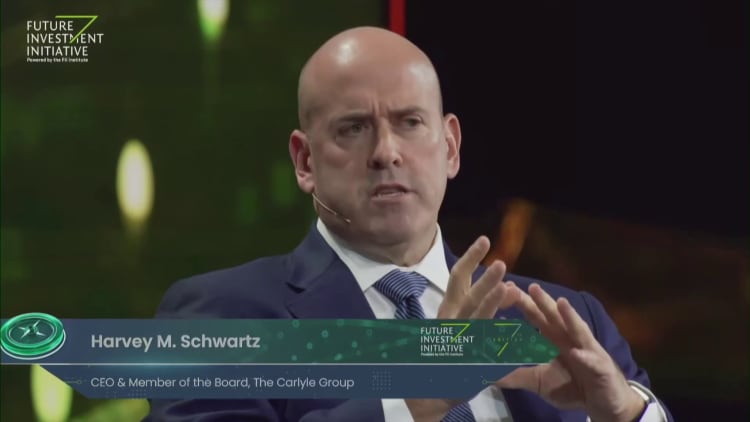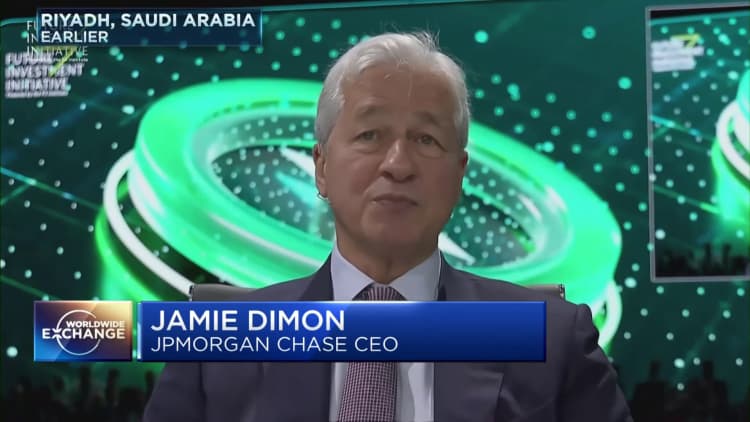This post was originally published on this site
- Wall Street leaders speaking at the annual Riyadh event broadly expressed varying degrees of pessimism and caution for the coming year.
- Carlyle Group CEO Harvey Schwartz stressed the presence of alpha opportunities even in the face of high interest rates and geopolitical conflict.

Several of Wall Street’s biggest names convened in Riyadh, Saudi Arabia, for the kingdom’s annual Future Investment Initiative, during which they weighed in on risks and opportunities for investors and the global economy.
Bankers speaking on panel discussions notably stressed headwinds — particularly in the short term — from multiple wars, an economic slowdown and an environment of high inflation and high fiscal deficits.
When asked about the risk outlook, Carlyle Group CEO Harvey Schwartz, former president of Goldman Sachs, advised caution but remained positive about alpha opportunities. Carlyle Group is one of the world’s largest private equity firms.
“I think this particular period, as we come out of a period of basically yield curve manipulation — which was done I think for very thoughtful reasons — but now we’re shifting out of that into a totally different regime, I think there’s reason for caution,” he said.
“But I think the year ahead will certainly present incredible alpha opportunities. But generally speaking I think we’ll have more of a headwind than a tailwind, and my own personal view is as we adjust to this rate regime, I think there are going to be more challenges in the near term. It doesn’t mean there won’t be great alpha opportunities.”
In a drive to combat the surging inflation that followed massive Covid-19 economic stimulus around the world, central banks have carried out the steepest interest rate increases in decades. Monetary policymakers have hiked rates “by about 400 basis points on average in advanced economies since late 2021, and around 650 basis points in emerging market economies,” according to the International Monetary Fund.
This dynamic increases credit risk, making it harder for people and businesses to borrow. Schwartz also highlighted the need to stay liquid in times of war to be best prepared for uncertainty.
“I think certain geopolitical risk, particularly war — again the tragedy of war and the loss of life — I think those are very difficult to price in the near term. Regardless of the conflict or where it is in the world,” he said.

“And I think you have to incorporate that into your risk assessment … if your appetite for risk is high, I think you can incorporate one way, if your appetite risk is low, then I think being much more liquid and being prepared for more uncertain outcomes, non-linear risk. You have to be prepared for those.”
In an earlier panel at the same event, JPMorgan CEO Jamie Dimon stressed the dangers of the present, particularly nuclear proliferation and war, as well as the U.S. having one of the largest peacetime fiscal deficits in its history. Bridgewater Associates founder Ray Dalio, for his part, said he was pessimistic about the global economy, pointing to war, widening wealth gaps and growing societal divides.
Schwartz, however, expressed optimism about the longer term, pointing to what he called big drivers of activity: advances in health and longevity, technology and artificial intelligence, and the energy transition.
“I think those are really significant drivers of economic activity, innovation, growth; they’re going to need lots of capital, we’ll need amazing thought leaders, we’ll need lots of global cooperation. And it’s hard not to be here today in the kingdom,” he added, “particularly this morning hearing Yasir (Al-Rumayyan, Saudi Public Investment Fund chief) speak, and not feel enthusiastic about the opportunity set.”




